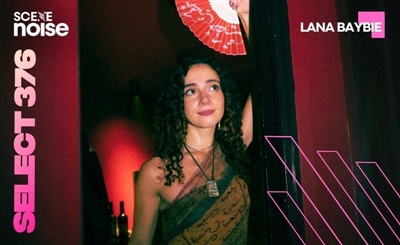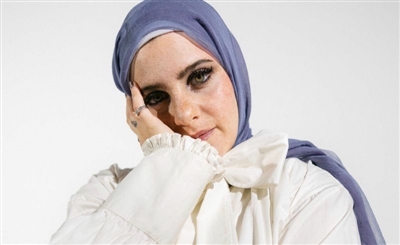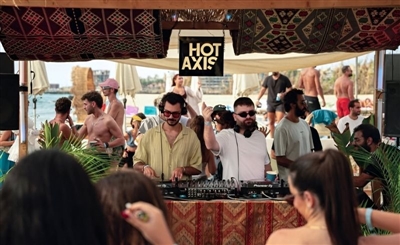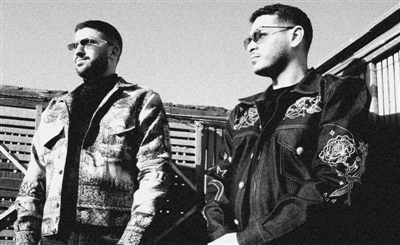Copied
Celebrity Photographer Steve Double on Capturing Nirvana and Life in Egypt
You can't turn around in Cairo without bumping into a wannabe photographer, but did you know that one of the world's most renowned celebrity photographers is residing here too? We talk to Steve Double, who has shot more of our idols than we can count...
Dec 20, 2018
.jpg)
Usually, a picture speaks a thousand words. Steve Double's pictures do not merely speak, but scream at the top of their lungs with a visual rhetoric that echoes through the ages, reverberating against the walls of our own nostalgia; nostalgia for an era that captured the subcultural zeitgeist.
The term "celebrity photographer" normally translates the image of paparazzi and cheesy gossip magazine shoots, where the aim is to make the star's light shine even more annoyingly. With Double's raw yet focused photography style, his lens sees past the bright lights and abducts a piece of the subject rarely seen by the public eye. Now, living in Cairo with his Egyptian wife, he has spent the last few decades taking pictures of the most famous people on the planet: Michael Jackson, Bono, Nirvana, Daft Punk, Björk, Nina Simone, Steve Jobs, Robert Duvall, Zaha Hadid, Tilda Swinton and many more of your idols. It's an endless list, and we were honoured to have the legendary photographer in to talk about his illustrious career.

Okay, what's Björk like?
She's got the strangest accent; it's like a weird mix of Icelandic and London street. She's genuinely crazy. The first time I met her was when I went to see The Sugarcubes, the band she was in before. It was in Iceland and you can understand why people there are crazy; they have six months of no sunshine and six months of no nights. I've been there in November and in July and it just really messes with your head. Reykjavik is like a Wild West town, I think there are only about 350 thousand people in the whole country and half of the population lives in Reykjavik.
So how did you get Daft Punk to take off their stupid helmets?
It was even before they invented those stupid helmets.

Daft Punk
How did you get started in photography?
I started in school actually. I can't draw; my drawings are like a two-year-old's! In high school I did physics, chemistry and maths, and then I actually started a physics degree at Sheffield University and while I was there I started thinking "I don't really like physics; what do I want to do?" I like photography, and I had joined the photography club in school, developing my own black and white pictures. I bought a cheap camera, a Russian Zenit, and started developing my own style. I actually had a total Road to Damascus experience: I was sitting in on a lecture on a wet Thursday in Sheffield in November, and this light bulb just came into my head that I remember until now: "I don't enjoy this. I don't want to do this. I know; I want to do something I enjoy. What do I enjoy? I enjoy photography. I know...I want to do photography." This chain of thought happened and I went to the career adviser at the university and told them I wanted to switch, which they were fine with. Universities don't want people to do something they're not interested in; if I don't enjoy what I am doing I might fail or drop out and that's bad for them too. They want you to do something you are passionate about. My father didn't seem happy about it - he hit the bloody roof! I looked for all the places in England where I could do my photography degree; anything less than a degree wasn't acceptable. I found some places offering a degree, worked on my portfolio - which was absolute poop, by the way - the first pictures I took were bits of old posters on the street, basically anything that I thought was edgy. That was my own foundation course I put myself through. Usually people try different things in the foundation course, like painting, sculpting and photography. I spent a year in Sheffield doing my own thing, putting together my portfolio using the dark room, then headed to uni again.

Björk
What was your first break?
I ended up at Derby University and got my Arts degree. I was playing saxophone in a band, and then started taking pictures of musicians. Then I saw an advert in TimeOut that hey tneeded young photographers with a phone number attached. I called up and arranged an appointment, but the night before the interview I went to a bar where The Pogues were playing, and they are big drinkers! They were all warming up before the gig and I took a Polaroid of them in the bar drinking, which I took along to TimeOut, and it worked! They gave me some more gigs to photograph and that's how I got my foot in the door. Stiff Records, to which The Pogues were signed, were quite famous back then and I started doing some stuff for them, as well as some photography for music magazines, newspapers and some live photography. The worst work I ever did was when I shot a whole gig without film in the camera. You only do that once.
Since you've mentioned film before, how has photography changed since the invention of digital cameras?
I spend more time in front of the computer and less time in the dark room.
Do you think it is a good development in photography?
Well, actually for a long time I'd shoot on colour film then print and scan it and then work with it on Photoshop. The only thing I miss about the film is the Polaroid. There are a lot of interesting organic looking treatments you can do with it. Apart from that, digital is great. It kind of brought a certain democratization to photography, and the base level of skill that you need to be able to take a decent picture is much lower. There is no point in being bitter about it, you just have to embrace it. There is definitely less work and more photographers these days though, so it's a tough industry.
Who are your inspirations in photography?
Richard Avedon, Diane Arbus and Arnold Newman; the real classic portrait and Hollywood-look photographers.
Why do you seem to prefer a more natural, raw approach to your portraits?
I always enjoy looking at people's faces. I've been getting in a lot of trouble in certain places for staring, actually! I think there is always so much in people's faces; I always find something interesting in each person...an expression, or something they do with their hands. It's hard to describe my working process.

Massive Attack
Is there a method you use to get this natural look out of people?
I just try to engage people in the process. Sometimes people that have been photographed a million times are nervous while taking pictures - Bryan Ferry, for example. Before I even started shooting, I was looking at him and was like "Oh my God, he's nervous! You're Bryan Ferry, a sex god to a million women!"
What's more important in producing a good photograph: the subject or the photographer?
It's a combination of both the sitter and the photographer; it's a two-way stream. You can get good pictures of a person like Paul Thomas Anderson, someone who is absolutely angry. On the other hand, you can spend an hour, two hours, four hours, with the person and there can be only two minutes that he is on. You are waiting for this spark; the moment they engage is what you're looking for.
How did you get the butterfly to stay on Four Tet's head?
Because it's not real! It's a fake one; I stuck it with a blu-tack haha!
What's the most intimidated you felt walking into a photo shoot and who was it with?
Vinny Jones, the football player.
What are you doing in Egypt?
My wife is half Egyptian and she has business here. You never want to live all your life in the same city. I lived in London for 27 years but now I travel back and forth. I'm back there quite often these days since we're working on a website for selling my prints. I've been selling gallery prints - hand-printed limited-edition ones - but now, especially with the digital technology, people don't want the photograph printed, they just want a digital image, so the site will mainly focus on pictures of celebrities, such as Bono and Michael Jackson. (Update: the shopping site is now live, check it out and buy your prints here: http://shop.double-whammy.com/)
Have you done any work here in Egypt?
Yes, I've done some. I did some advertising stuff with the Egyptian actor Ahmed Ezz for KFC, which is great for a vegetarian! It was a lot of fun actually. [I did] the Shrimpo campaign on a pirate boat. The Economist has a monthly culture booklet called Intelligent Life and they publish a 10-page photo essay that they do every issue. I did two of them with my iPhone, using an application called Shake It that does Polaroid type pictures. One of the current projects I'm doing in Cairo is photographing dead cars all over the city. There's one I'm going to shoot next, an enormously big Galaxy 500, like the ones cops used back in the day, that's covered in dust and smashed up. There are so many beautiful old cars around Cairo, because there are no road taxes and you can just dump your car in the street.
How come you didn't jump on the revolutionary photograph bandwagon?
I am not a documentary photographer, and I am not a journalistic photographer. Besides, you don't need some khawaga coming in and photographing your revolution. What do you need that for? There are enough people here that have the skill and talent; they can photograph it themselves and do it much better than I would.
What do you think of CairoZoom? A lot of people criticize our sister site for being frivolous when serious things are happening in the country...
Get over yourself! I, mean, really! There is serious stuff happening, I agree absolutely, but is everyone going to sit in their bedrooms all night? Curfew is bad enough. Life has to go on. I think by doing something, showing that people are still able to enjoy themselves, go out and have fun is a benefit for the country.
Is there any politician you would like to take a photo of?
I'd like to photograph Obama. That would be interesting. There's a photographer called Platon who has amazing photographs of world leaders, like his studio is in a UN meeting. He's got amazing stories and some beautiful photographs. He's photographed Kaddafi and, with the whole story behind it as well, it's absolutely amazing. I really like his work a lot. Sisi would also be interesting to photograph in a proper looking uniform. Egyptian Army has good uniforms.
Say you're given the access to photograph both Morsi and Sisi. How would you photograph them? In what situations?
Oh, that's interesting! Controversial! I think I would actually photograph them in my kind of standard way. I would really focus on them and try to bring out their personalities and features; a very close shot. I'd go for something quirky or unusual they do and try to pull off the mask that they put on in public. That's the difficult thing.
You obviously had loads of crazy memorable experiences and they've produced amazing photos. What do you hold closer, the experience of the photo shoot and the traveling or the finished product?
That's a very good question. I think both are important. I can say that time with Nirvana was amazing but I don't stay up at night thinking about it...

Nirvana
Just how amazing was your time with Nirvana?
It was twice. The first time was when their first album had just come out and I was with them for five days. They were performing in small clubs, the drummer was driving the van, and they smashed their equipment because they thought they'd had a bad show. For some reason Kurt wore a dress to the next one. Rough and ready! The second time was neutral, it was at a stadium. I spent two days with them in Valencia and Madrid. It was an absolute nightmare! Kurt was on crack and Courtney Love was screaming the whole time. I have all these memories that I occasionally have to write about or discuss with lovely people like you. But the photographs have a life beyond that. I mean, those are my personal stories - the photos actually live on in people's memories; people remember how it was taken and connect it with music.
When taking a photo do you have to keep a certain distance from your subject?
No, I don't think it makes any difference. The funny thing, with some people you can have very little interaction but get great pictures. And other people you can know them really well, for ages, but still do messy work. I mean, obviously you do your best to get an amazing shot every single time. I love photography, I love taking pictures.
What do you want your legacy to be?
Well, I was thinking a few small monuments. Can you guys arrange it? Nothing too big or fancy, haha!
Who takes your family photos?
Me! My wife always complains I'm not taking enough though!
What is your favourite photo of yours?
It's impossible to answer. I can run through a few. There is one of Bono at the bar of a plane traveling from gig to gig. It was a 747 that has 35 seats; it has more crew than passengers! I actually really like the Vinny Jones shot, just because he looks so horrific and evil in it. There's one of Robert Smith that I like, because it's a classic Robert Smith picture where all you can see is his red lips and big hair. And obviously, the next picture I am going to take.

Vinny Jones
Is there anyone you refused to photograph?
No, the only person that crossed my mind is David Irving, former leader of the BNP (a controversial extreme right-wing British political party). He was kind of sad and lonely. But I still tried to get something good out of it.
What do you think is the most cliché photo all starting photographers take?
Pictures of children, especially when you take pictures of your own kid and you expect everyone else to be interested in them! I took a lot of pictures of people who are dead now. My friend says I've got a lens of doom.
What advice would you give to young Egyptian photographers?
Do what you are interested in. Stick to your guns. Look at what are other people are doing in your field and try to do something of your own, something that comes from your heart and soul that really belongs to you.
Do you ever use Instagram?
A bit, I kind of play around with it, post some things. It's really interesting; it's like a visual diary of the world.
- Previous Article Getting Abyusif
- Next Article 23 Must-Watch Middle Eastern Music Documentaries
Trending This Month
-
Jan 29, 2026






















